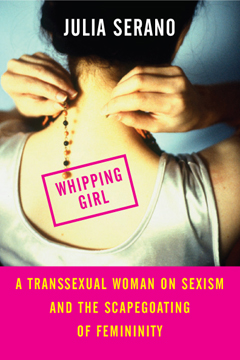Related Research Articles

Transphobia consists of negative attitudes, feelings, or actions towards transgender people or transness in general. Transphobia can include fear, aversion, hatred, violence or anger towards people who do not conform to social gender roles. Transphobia is a type of prejudice and discrimination, similar to racism, sexism, or ableism, and it is closely associated with homophobia. People of color who are transgender experience discrimination above and beyond that which can be explained as a simple combination of transphobia and racism.
Shemale is a term most commonly used in the pornography industry to describe trans women or other people with male genitalia and female secondary sex characteristics acquired via hormones or surgery. Many people in the transgender community consider the term offensive and degrading. Using the term shemale for a trans woman may imply that she is working in the sex trade.
The following outline is provided as an overview of and topical guide to transgender topics.

Leslie Feinberg was an American butch lesbian, transgender activist, communist, and author. Feinberg authored Stone Butch Blues in 1993. Her writing, notably Stone Butch Blues and her pioneering non-fiction book Transgender Warriors (1996), laid the groundwork for much of the terminology and awareness around gender studies and was instrumental in bringing these issues to a more mainstream audience.

Transfeminism, or trans feminism, is a branch of feminism focused on transgender women and informed by transgender studies. Transfeminism focuses on the effects of transmisogyny and patriarchy on trans women. It is related to the broader field of queer theory. The term was popularized by Emi Koyama in The Transfeminist Manifesto.

The Transgender Day of Remembrance (TDoR), also known as the International Transgender Day of Remembrance, has been observed annually from its inception on November 20 to memorialize those who have been murdered as a result of transphobia. The day was founded to draw attention to the continued violence directed toward transgender people.
The gender binary is the classification of gender into two distinct forms of masculine and feminine, whether by social system, cultural belief, or both simultaneously. Most cultures use a gender binary, having two genders.

Gender nonconformity or gender variance is behavior or gender expression by an individual that does not match masculine or feminine gender norms. A gender-nonconforming person may be variant in their gender identity, being transgender or non-binary, or they may be cisgender. In the case of transgender people, they may be perceived, or perceive themselves as, gender-nonconforming before transitioning, but might not be perceived as such after transitioning. Transgender adults who appear gender-nonconforming after transition are more likely to experience discrimination.

Stone Butch Blues is an autobiographical novel by Leslie Feinberg. Written from the perspective of stone butch lesbian Jess Goldberg, it intimately details her life in the last half of the 20th century in New York.
Street Transvestite Action Revolutionaries (STAR) was a gay, gender non-conforming and transvestite street activist organization founded in 1970 by Sylvia Rivera and Marsha P. Johnson, subculturally-famous New York City drag queens of color. STAR was a radical political collective that also provided housing and support to homeless LGBT youth and sex workers in Lower Manhattan. Rivera and Johnson were the "mothers" of the household, and funded the organization largely through sex work. STAR is considered by many to be a groundbreaking organization in the queer liberation movement and a model for other organizations.

Joan of Arc, a celebrated French historical figure who was executed by the English for alleged heresy in 1431, is a national heroine of France and a Roman Catholic saint. Joan was accompanied by an army during the Hundred Years War, then adopting the garb of a soldier, which ultimately provided a pretense for her conviction and execution. A number of contemporary commentators including some scholars have described her wearing of armor including certain articles of men's clothing most notably as described by priests and officials of the Catholic Church leading up to and during her trial, as crossdressing. Whether her so-called crossdressing, and that beyond which has been misconstrued regarding her lifestyle, have implications for her sexuality or gender identity is a matter of debate among historians and queer theorists.

A transgender person is someone whose gender identity differs from that typically associated with the sex they were assigned at birth. Some transgender people who desire medical assistance to transition from one sex to another identify as transsexual. Transgender can function as an umbrella term; in addition to including binary trans men and trans women, it may also include people who are non-binary or genderqueer. Other definitions of transgender also include people who belong to a third gender, conceptualize transgender people as a third gender, or conflate the two concepts. The term may also include cross-dressers or drag kings and drag queens in some contexts. The term transgender does not have a universally accepted definition, including among researchers.

The transgender rights movement is a movement to promote the legal status of transgender people and to eliminate discrimination and violence against transgender people regarding housing, employment, public accommodations, education, and health care. A major goal of transgender activism is to allow changes to identification documents to conform with a person's current gender identity without the need for gender-affirming surgery or any medical requirements, which is known as gender self-identification. It is part of the broader LGBT rights movements.

This article addresses the history of transgender people in the United States from prior to Western contact until the present. There are a few historical accounts of transgender people that have been present in the land now known as the United States at least since the early 1600s. Before Western contact, some Native American tribes had third gender people whose social roles varied from tribe to tribe. People dressing and living differently from the gender roles typical of their sex assigned at birth and contributing to various aspects of American history and culture have been documented from the 17th century to the present day. In the 20th and 21st centuries, advances in gender-affirming surgery as well as transgender activism have influenced transgender life and the popular perception of transgender people in the United States.

Whipping Girl: A Transsexual Woman on Sexism and the Scapegoating of Femininity is a 2007 book by the gender theorist, biologist, and writer Julia Serano. The book is a transfeminist manifesto that makes the case that transphobia is rooted in sexism and that transgender activism is a feminist movement. The second edition of the book was published in March 2016.
Feminist views on transgender topics vary widely.
"The Empire Strikes Back: A Posttranssexual Manifesto" is a 1987 essay written by Sandy Stone. Stone's essay is considered to be the founding text of transgender studies in academia, with other critical transgender works emerging after it. The essay examines how transgender women have historically been viewed, studied, and treated by the western medical establishment.
Neopronouns are neologistic third-person personal pronouns beyond those that already exist in a language. In English, neopronouns replace the existing pronouns "he", "she", and "they". Neopronouns are preferred by some non-binary individuals who feel that they provide options to reflect their gender identity more accurately than conventional pronouns.
Discrimination against transgender men and transmasculine individuals is sometimes referred to as transandrophobia, anti-transmasculinity, or transmisandry.
Cisnormativity or cissexual assumption is the assumption that everyone is, or ought to be, cisgender. The term can further refer to a wider range of presumptions about gender assignment, such as the presumption of a gender binary, or expectations of conformity to gender roles even when transgender identities are otherwise acknowledged. Cisnormativity is a form of cisgenderism, an ideology which promotes various normative ideas about gender, to the invalidation of individuals' own gender identities, analogous to heterosexism or ableism.
References
- 1 2 3 4 Schwartz, Patricia Roth. "Reviews: Transgender." Lambda Book Report, vol. 5, no. 2, Aug. 1996, p. 32.
- 1 2 3 Review of Transgender Warriors, by Leslie Feinberg. Kirkus March 15, 1996
- ↑ Feinberg, Leslie. Transgender Warriors: Making History from Joan of Arc to Dennis Rodman. Beacon Press, 1996. page XV
- ↑ Stryker, Susan. Transgender History. Seal Press, 2017
- 1 2 Kaivola, Karen. "The Ethics of Difference in an Age of Technological Gender B(l)Ending." Mosaic, vol. 30, no. 3, 1997, pp. 197.
- 1 2 Golden, Clara. "Beyond the Impoverishment of Gender Boxes" Review of Transgender Warriors: Making History from Joan of Arc to Dennis Rodman, by Leslie Feinberg. BOOK REVIEWS, Journal of Lesbian Studies, 4:2, 159-174, DOI:10.1300/J155v04n02_11
- ↑ Review of Transgender Warriors: Making History from Joan of Arc to Dennis Rodman, by Leslie Feinberg. Publishers Weekly, 29, Apr. 1996
- ↑ "Firecracker Alternative Book Awards". ReadersRead.com. Archived from the original on March 4, 2009.